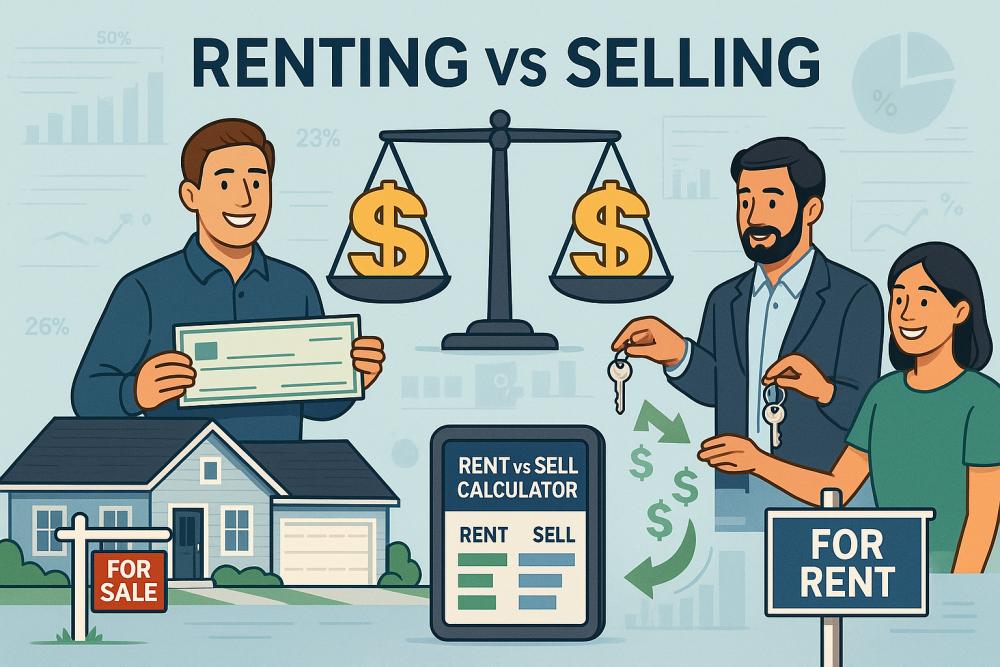
Rent vs Sell Calculator: Which Option is Best for You?
Deciding whether to rent or sell your property can be challenging. Both options have financial and lifestyle implications, and making the wrong choice could cost you thousands. A rent vs sell calculator can help you analyze the numbers and determine the best path forward.
In this comprehensive guide, we’ll explore:
-
The key factors to consider when choosing between renting and selling
-
How a rent vs sell calculator works
-
Pros and cons of renting vs. selling
-
Real-life scenarios where renting or selling makes more sense
-
Top rent vs. sell calculators available online
By the end, you’ll have a clear understanding of which option aligns with your financial goals.
Key Factors to Consider: Rent vs. Sell
Before using a rent vs sell calculator, you need to evaluate several factors:
1. Current Market Conditions
-
Is it a seller’s market (high demand, low inventory)? Selling could maximize profit.
-
Is it a renter’s market (high rental demand)? Renting may provide steady income.
2. Financial Situation
-
Do you need immediate cash from selling?
-
Can you afford maintenance costs, property taxes, and insurance as a landlord?
3. Long-Term Goals
-
Are you looking for passive income? Renting may be better.
-
Do you want to eliminate property management responsibilities? Selling could be ideal.
4. Tax Implications
-
Selling may trigger capital gains tax (unless you qualify for an exemption).
-
Renting offers tax deductions (mortgage interest, depreciation, repairs).
5. Emotional Attachment
-
Do you plan to return to the property in the future?
-
Are you comfortable being a landlord?
A rent vs sell calculator helps quantify these factors, making your decision data-driven.
How a Rent vs Sell Calculator Works
A rent vs sell calculator compares the financial outcomes of both options by analyzing:
Inputs Needed:
✅ Property Value – Current market price if sold.
✅ Monthly Rent – Expected rental income.
✅ Mortgage Details – Remaining balance, interest rate, and monthly payments.
✅ Expenses – Maintenance, property taxes, insurance, HOA fees, property management fees.
✅ Appreciation Rate – Expected annual increase in property value.
✅ Investment Returns – What you could earn if you invested sale proceeds elsewhere.
Outputs Provided:
📊 Net Profit from Selling – After paying off the mortgage, taxes, and fees.
📊 Net Profit from Renting – Rental income minus expenses over time.
📊 Break-Even Point – When renting becomes more profitable than selling.
Example Calculation:
| Factor | Selling | Renting |
|---|---|---|
| Property Value | $400,000 | – |
| Sale Costs (6%) | -$24,000 | – |
| Mortgage Payoff | -$250,000 | – |
| Net from Sale | $126,000 | – |
| Monthly Rent | – | $2,500 |
| Expenses | – | -$800/mo |
| Net Rental Income | – | $1,700/mo |
| Annual Appreciation (3%) | – | +$12,000/yr |
In this scenario:
-
Selling gives you $126,000 upfront.
-
Renting provides $20,400/year in net income + appreciation.
A rent vs sell calculator projects these numbers over 5, 10, or 20 years to determine the better option.
Pros and Cons of Renting vs. Selling
Pros of Renting Out Your Property
✔ Steady Passive Income – Monthly cash flow from rent.
✔ Long-Term Appreciation – Property value may increase over time.
✔ Tax Benefits – Deduct mortgage interest, repairs, and depreciation.
✔ Future Flexibility – You can sell later if the market improves.
Cons of Renting Out Your Property
❌ Landlord Responsibilities – Maintenance, tenant issues, vacancies.
❌ Market Risks – Property values or rents could decline.
❌ Liquidity Issues – Your money is tied up in the property.
Pros of Selling Your Property
✔ Lump-Sum Cash – Immediate funds for other investments or needs.
✔ No More Hassles – No maintenance, tenant problems, or vacancies.
✔ Avoid Market Risks – Lock in profits before a potential downturn.
Cons of Selling Your Property
❌ Capital Gains Tax – Unless you qualify for an exemption.
❌ Missed Appreciation – If the property value rises significantly later.
❌ Transaction Costs – Agent fees, closing costs (typically 6-10% of sale price)
When Should You Rent vs. Sell?
When Renting is Better:
-
High Rental Demand – You can charge enough rent to cover expenses.
-
Low Mortgage Rate – Fixed-rate loans make cash flow easier.
-
Long-Term Investment – You’re willing to hold for 5+ years.
When Selling is Better:
-
You Need Cash Now – For a new home, debt payoff, or investments.
-
Declining Market – Property values are dropping.
-
High Maintenance Costs – Older homes may not be worth keeping.
Final Verdict: Should You Rent or Sell?
The best choice depends on your financial situation, market conditions, and long-term goals. A rent vs sell calculator removes the guesswork by providing a data-driven comparison.
Quick Decision Checklist:
-
✅ Use a rent vs sell calculator to compare scenarios.
-
✅ Check local rental demand & property values.
-
✅ Consider your cash flow needs & risk tolerance.
-
✅ Consult a financial advisor or real estate agent.
If passive income and long-term growth appeal to you, renting may be ideal. If you need liquidity and want to avoid landlord duties, selling could be the smarter move.
Conclusion
Deciding whether to rent or sell your home is a major financial decision. A rent vs sell calculator helps you weigh the numbers objectively, considering rental income, property appreciation, tax benefits, and alternative investment returns.
By analyzing your personal situation and using the tools mentioned, you can confidently choose the best path for your financial future.
